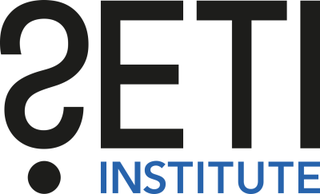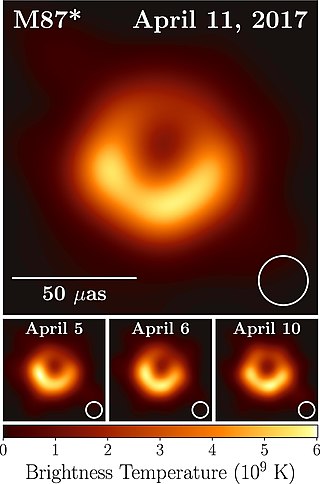Related Research Articles

Carl Edward Sagan was an American astronomer, planetary scientist, cosmologist, astrophysicist, astrobiologist, author, and science communicator. His best known scientific contribution is his research on the possibility of extraterrestrial life, including experimental demonstration of the production of amino acids from basic chemicals by radiation. Sagan assembled the first physical messages sent into space, the Pioneer plaque and the Voyager Golden Record, universal messages that could potentially be understood by any extraterrestrial intelligence that might find them. Sagan argued in favor of the hypothesis, accepted since, that the high surface temperatures of Venus are the result of the greenhouse effect.

The SETI Institute is a not-for-profit research organization incorporated in 1984 whose mission is to explore, understand, and explain the origin and nature of life in the universe, and to use this knowledge to inspire and guide present and future generations, sharing knowledge with the public, the press, and the government. SETI stands for the "search for extraterrestrial intelligence".

The Courant Institute of Mathematical Sciences is the mathematics research school of New York University (NYU), and is among the most prestigious mathematics schools and mathematical sciences research centers in the world. Founded in 1935, it is named after Richard Courant, one of the founders of the Courant Institute and also a mathematics professor at New York University from 1936 to 1972, and serves as a center for research and advanced training in computer science and mathematics. It is located on Gould Plaza next to the Stern School of Business and the economics department of the College of Arts and Science.
Ray Jayawardhana is the Harold Tanner Dean of the Cornell University College of Arts and Sciences and a Professor of Astronomy at Cornell University, effective September 1, 2018. He was formerly Dean of Science and a Professor of physics & astronomy at York University. Prior to that, he was a Professor of Astronomy & Astrophysics at the University of Toronto, and an Assistant Professor of Astronomy at the University of Michigan. An award-winning science writer, his primary research areas include the formation and early evolution of stars, brown dwarfs and planets.. His current research focuses on characterizing exoplanets using telescopes on the ground and in space.

John Cromwell Mather is an American astrophysicist, cosmologist and Nobel Prize in Physics laureate for his work on the Cosmic Background Explorer Satellite (COBE) with George Smoot.
Carl M. Bender is an American applied mathematician and mathematical physicist. He currently holds the Wilfred R. and Ann Lee Konneker Distinguished Professorship of Physics at Washington University in St. Louis. He also has joint positions as Professor of Physics at the University of Heidelberg and as Visiting Professor of Applied Mathematics and Mathematical Physics at Imperial College, London.
The Sloan Research Fellowships are awarded annually by the Alfred P. Sloan Foundation since 1955 to "provide support and recognition to early-career scientists and scholars". This program is one of the oldest of its kind in the United States.

Feryal Özel is a Turkish-American astrophysicist born in Istanbul, Turkey, specializing in the physics of compact objects and high energy astrophysical phenomena. As of 2022, Özel is the Department Chair and a professor at the Georgia Institute of Technology School of Physics in Atlanta. She was previously a professor at the University of Arizona in Tucson, in the Astronomy Department and Steward Observatory.

The Miller Institute for Basic Research in Science was established on the University of California, Berkeley, campus in 1955 after Adolph C. Miller and his wife, Mary Sprague Miller, made a donation to the university. It was their wish that the donation be used to establish an institute "dedicated to the encouragement of creative thought and conduct of pure science".
The Presidential Young Investigator Award(PYI) was awarded by the National Science Foundation of the United States Federal Government. The program operated from 1984 to 1991, and was replaced by the NSF Young Investigator (NYI) Awards and Presidential Faculty Fellows Program (PFF) and subsequently the NSF CAREER Awards and the PECASE.
The Simons Institute for the Theory of Computing at the University of California, Berkeley is an institute for collaborative research in theoretical computer science.
A Beckman Fellow receives funding, usually via an intermediary institution, from the Arnold and Mabel Beckman Foundation, founded by Arnold Orville Beckman and his wife Mabel. The Foundation supports programs at several institutions to encourage research, particularly the work of young researchers who might not be eligible for other sources of funding. People from a variety of different programs at different institutions may therefore be referred to as Beckman Fellows. Though most often designating postdoctoral awards in science, the exact significance of the term will vary depending on the institution involved and the type(s) of Beckman Fellowship awarded at that institution.
Meera Chandrasekhar, is a Curators’ Teaching of Physics and Astronomy at the University of Missouri, United States. She is the recipient of the 2014 Baylor University's Robert Foster Cherry Award for Great Teaching. Her research focuses on optical spectroscopy of semiconductors and superconductors under pressure. Meera has also developed several hands-on physics programs for students in grades 5-12, and summer institutes for K-12 teachers.

Sarah Ballard is an American Professor of Astronomy currently at the University of Florida. She has been a Torres Fellow at the Massachusetts Institute of Technology, a L'Oreal Fellow, and a NASA Carl Sagan Fellow.

Stefi Baum is an American astronomer. The American Astronomical Society honored her work by awarding her the Annie J. Cannon Prize in 1993. Baum helped to develop the Hubble Space Telescope and, starting in 2004, was the director of Rochester Institute of Technology’s Chester F. Carlson Center for Imaging Science.

The College of Science at the University of Utah is an academic college of the University of Utah in Salt Lake City, Utah. The college offers undergraduate and graduate degrees in biology, chemistry, mathematics, physics, and astronomy.
Robert Henry “Pete” Bragg Jr., was a professor in the Department of Materials Science and Engineering in the UC Berkeley College of Engineering.